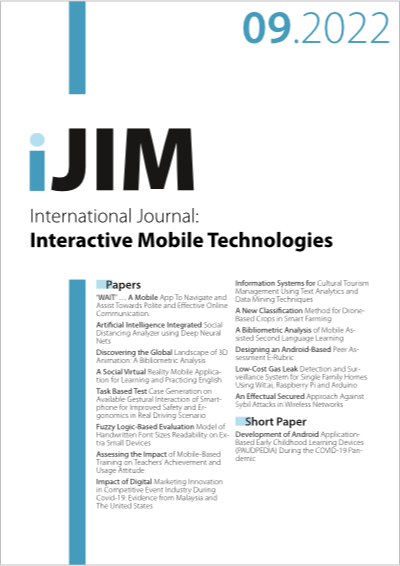Designing an Android-Based Peer Assessment E-Rubric
DOI:
https://doi.org/10.3991/ijim.v16i09.28107Keywords:
e-rubrics, android-based assessment, online teaching, peer assessmentAbstract
Abstract—Previous research has shown that peer assessment has beneficial effects on students’ learning. Inspired by the need of students to involve peer assessment for gaining some constructive feedback for their works, such as in translation and writing courses, we developed an android-based e-rubric. Android was favored as the assessment platform due to its customizability and affordability. Two classes of English Department with 54 students participated in this research. Interviews and focus-group discussions were conducted to obtain data for needs analysis and collect users’ feedback, whereas the online survey was done to measure the students’ satisfaction. The e-rubric was developed through eight stages: (1) needs analysis, (2) development of rubrics, (3) expert validation, (4) creating the e-rubric app, (5) implementation, (6) users’ feedback, (7) product refinement, and (8) survey of users’ satisfaction. The results show that the developed e-rubric app is useful for supporting collaborative works among students as it allows them to assess each other’s strengths and weaknesses. Moreover, the android platform gives them a handy-and-engaging experience for completing the assessment. In this paper, we review relevant literature justifying the development of the app, outline the formulation steps, and explain how the app can be used in the classroom. Taking the limitations of the app development into account, we propose some recommendations for future research.
Downloads
Published
How to Cite
Issue
Section
License
Copyright (c) 2022 Hilda Cahyani, Ardian Wahyu Setiawan, Nadia Hanayeen

This work is licensed under a Creative Commons Attribution 4.0 International License.



